Giving Thanks
There are so many things in my life that I feel thankful for, and Thanksgiving gives an opportunity to reflect on these feelings of gratitude. For our newsletter I wanted to share the deep gratitude I have for my personal journey out of back pain, and for how that journey continues as a growing ability to support and empower others in this direction.
When I came to write this blog post, I quickly realized that this is a daunting task! The truth is that so many people have played invaluable parts, both great and small, in helping me to create the Gokhale Method® that it’s impossible to pay tribute to everyone in a short piece of writing. So I decided there will be other posts of gratitude, including to my teachers, to the people around the globe on whom this work is based, and to our team of dedicated teachers and staff. But on this National Day of Thanksgiving, I’d like to focus on things related to living and working in the US.
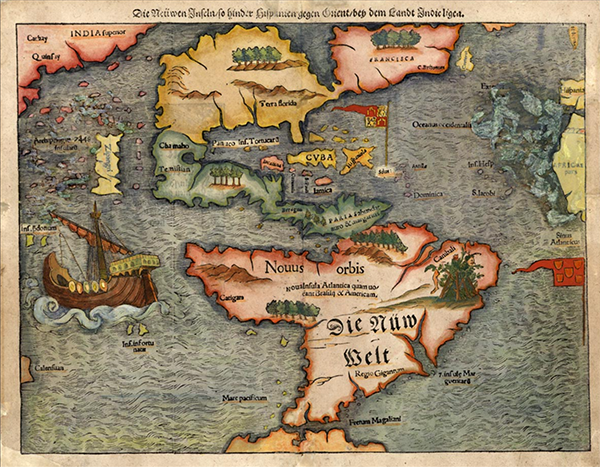
The settling of people from all over the world in North and South America has brought innovation and enthusiasm for new ideas. This is Sebastian Münster’s Map of the New World, published in 1540. Wikipedia
The US has a uniquely multifaceted heritage
I feel grateful to live in the salad bowl that is the US. At its best, the US benefits from embracing ideas and traditions from all over the world. It has a track record of weaving together influences that enhance the richness of life and result in vibrant, new, and exciting ways of solving problems.
One of the ways in which the Gokhale Method® is quintessentially American is that it draws on healthy inputs from different cultures, theories, technologies, and more. We actively search out kinesthetic traditions of people all over the world, past and present, and learn from the best of what works. Since so many people visit and settle in the US, studying other movement and bodywork traditions becomes especially accessible, whether we are looking at massage, dance, or gardening.
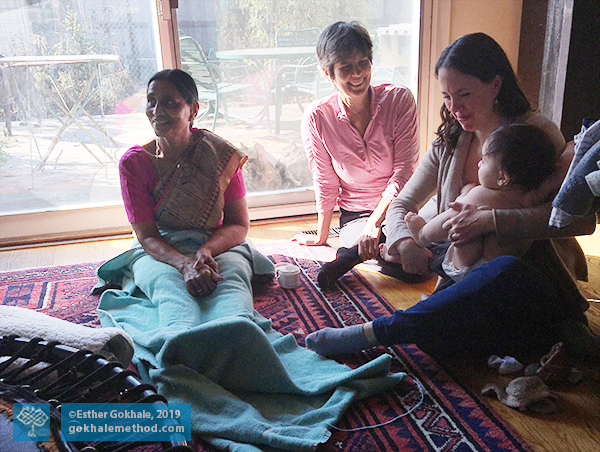
Nirmala, a baby masseur from India visiting friends in California, prepares to massage a baby on her lap.
Gokhale Method alumna Joan Baez dancing in her kitchen with her friend Jesus Morales (better known as Chuy), who hails from Mexico. He has typically excellent form—his behind stays behind, his back is upright, and his shoulders remain back.
American “can do” can help to solve back pain
Americans have some qualities in common with teenagers—a boldness to experiment and reinvent ourselves, and a willingness to put ourselves out there without necessarily having the training or experience to get the job done. A can-do mentality with readiness to learn along the way doesn’t guarantee success (according to the US Bureau of Labor Statistics, only 35% of new businesses survive for 10 years), but the businesses that do survive often couldn’t have gotten off the ground at all through more conventional progression and do provide valuable services and products to society.
I don’t have an MBA, and I started the Gokhale Method 30 years ago with no idea of how to launch a business, manage staff, or use an Excel spreadsheet. Many mistakes happened along the way, and yet our small raft of a company became seaworthy, is still afloat, and continues to set sail in new waters to bring relief to an increasing number of people.
We have evolved a highly efficient and effective solution to back pain and other debilitating musculoskeletal problems—15,000 people have taken our courses to date, and over 250,000 copies of 8 Steps to a Pain Free Back have sold. There’s much more to be done, though—back pain remains the number one cause of disability globally, and 80% of people in the US alone are expected to experience a significant back problem during their lives. The Gokhale Method mission “to make back pain rare” continues.
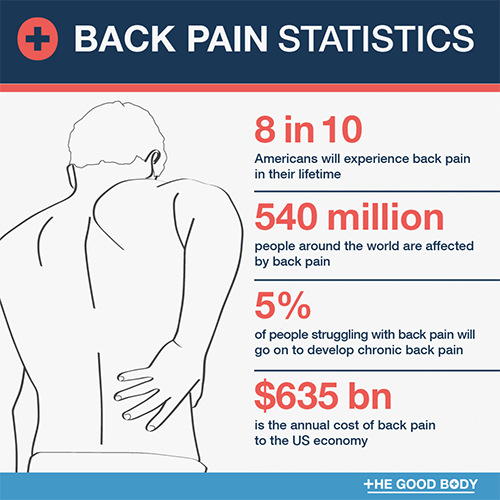
Each statistic represents a personal story of pain, disability, and often financial stress. www.thegoodbody.com
Innovation is recognized and valued in the US
I’ve been promoting the J-spine paradigm for over three decades now. (You can read more about spine shape here.) It’s a radical departure from conventional wisdom’s S-spine paradigm, but based on compelling arguments and a growing body of evidence, the Gokhale Method has been welcomed into physician training courses, retreats, and conferences, and will now be the subject of a randomized control trial (RCT) at a major university. This level of openness and acceptance of disruptive approaches is more common in the US than in many other societies.
Americans love new ideas—even when they’re old ideas!
Back in the 1990s I was studying posture in Portugal, because the average posture in southern Europe was still notably healthier than in the US. While I was carrying my baby on my back, using an African wrap, concerned people who saw me would give well-meaning advice on how to carry a baby properly. Of course, this came from their best intentions to help me take care of my baby, but still, back in the US, I found people around me much more amenable to incorporating such techniques. Here I encounter people wanting to learn this traditional skill I had originally learned from an African friend.
I am carrying my youngest daughter on my back. This way of carrying infants encourages healthy posture in both mother and child.
Philanthropy and support
For most of my time in the US I have lived in the Bay area, which happens to have one of the highest densities of philanthropic donors in the US. Innumerable students from the Bay Area and elsewhere in the US over the years have stepped up in a variety of ways to offer support to our organization by way of legal advice, mentorship, business strategy, and funding for research. In 2020 we managed to raise enough money in donations for the randomized control trial (RCT) that is happening in a major university next year, from students who wanted to see the benefits they received from this work extended to a wider public.
Of course it’s natural to have the largest following, and therefore the largest number of supporters, locally. In fact, in spite of the distances, people from all over the globe have stepped up to offer a variety of kinds of support—back pain is truly a global problem.
Our company continues to receive much “behind the scenes” help. Often these supporters stepped up without me asking. A number of people eminent in their field, including musician, artist, and activist Joan Baez, have been extremely generous with their endorsement of our method. We have also received donations—of antique photographs and artifacts showing healthy posture—to the Gokhale Method Institute’s collection. People have come forward and offered us accommodation and venues. There is truly no way that our organization could have reached its current level without all this help.
It especially touches my heart when students are courageous and willing to share their story, be that by talking to others, writing a blog post, or giving a testimonial. This is never an expectation, but another gift for which I am truly thankful as it inspires others to have realistic hope that they too can learn the Gokhale Method and live without pain.
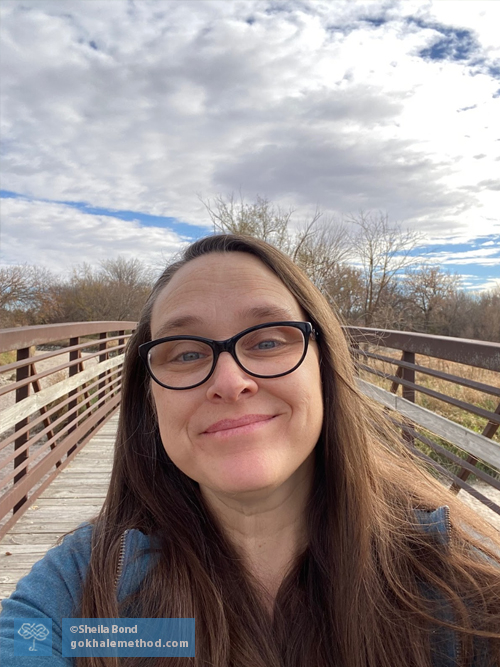
Many of our students generously share their stories. Here is Sheila Bond, who was featured in our most recent blog post.
Americans are at the frontier of wearable tech
Over the last seven years, we’ve developed ground-breaking wearables, including our user-friendly PostureTracker™. No door was ever closed to us for lack of formal training in technology or tech enterprise. We learned as we went along and persisted through to the finish line and now have a unique and sophisticated tool to assist our students in transforming their posture education into posture habits. PostureTracker is now available as an add-on to our in-person Foundations and Pop-up courses, our online Elements course, as well our in-person and online Alumni offerings. Our next deep-dive online Alumni PostureTracker Course starts on January 11 next year.
This clip from our Secrets to Pain-Free Sitting DVD shows students using our PostureTracker wearable.
Being positive is cool in the US
Positive reinforcement as a teaching style, as well as a tenet of company culture, is a data-supported choice that has been widely embraced in the US. I was raised with some degree of the Calvinistic notion that a little negativity is a necessary part of being real. And my own posture training included spurs like, “How can you stand to be so ugly?” (To many of us this will be surprising, but as part of “old school” pedagogy, it’s nowhere near caning school children, which used to be a common practice). So I’m grateful I got to see that authentic positive reinforcement works, works really well, and leaves no scars behind.
I believe a positive approach is especially important in the field of posture because posture has historically been laced with negative reinforcement, ridicule, and even racism. Posture is a very personal matter for most people, so it is important that people feel safe, embraced, and encouraged as they go about their journey of improving themselves. It is an integral part of our teacher training that a positive stance is woven into our teaching, our touch, and our vision, and I feel grateful for my 45+ years in the US for supporting this.
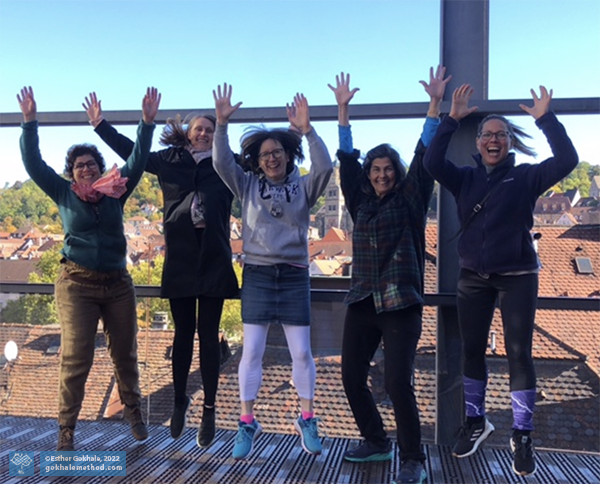
Julie and I celebrate with our most recently trained teachers—this time in Germany! (Left to right: Michal, Ines, Julie, Me, and Johanna.)
If you would like guidance on any aspect of your posture and spine shape, consider scheduling an Initial Consultation, online or in person, with a Gokhale Method teacher.
If you would like to find out more about how the Gokhale Method can help support you, sign up to join one of our upcoming FREE Online Workshops. . .

Comments
What a wonderful blog post.
What a wonderful blog post. Thank you, Esther, for persisting in bringing this information into the world. I, for one, am thankful for it!
Thank you, Elly!
Thank you, Elly!
Hello, I appreciate your post
Hello, I appreciate your post. The material that is mentioned here will help me in preparing PowerPoint presentation for me https://essayservice.com/powerpoint-presentation and I will complete it on time as it planned.
Strengthening and developing
Strengthening and developing functioning feet can be achieved by including exercises such as kidney-bean shaping and inchworm. Furthermore, the idea of the geometry dash world which evaluates a person's degree of innocence or purity based on a variety of experiences and deeds, comes to mind when the significance of actively interacting feet is mentioned. Nurturing and strengthening our feet can result in a more robust and balanced running experience, much as keeping pure intentions throughout the test.
Add New Comment
Login to add commment
Login